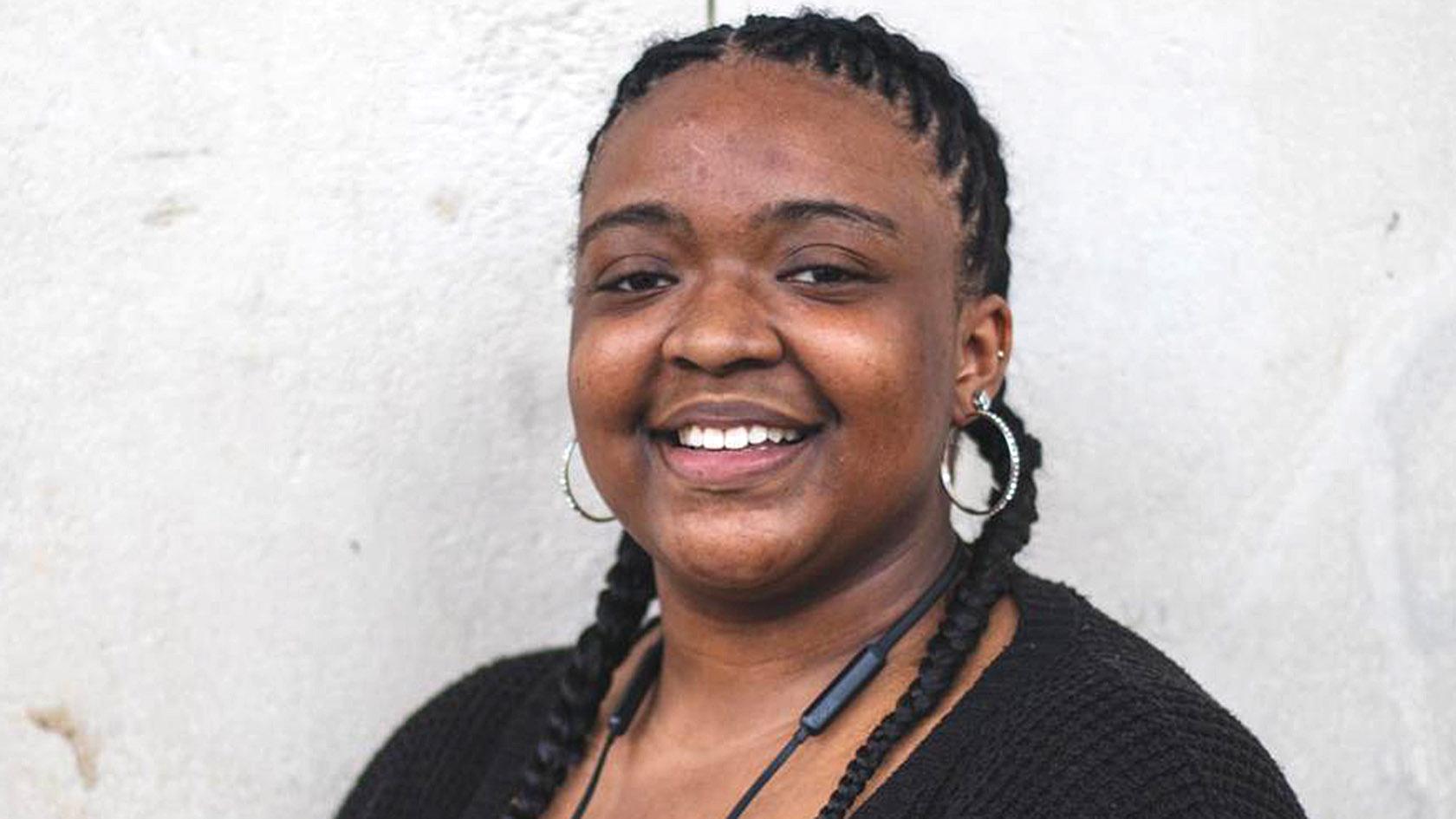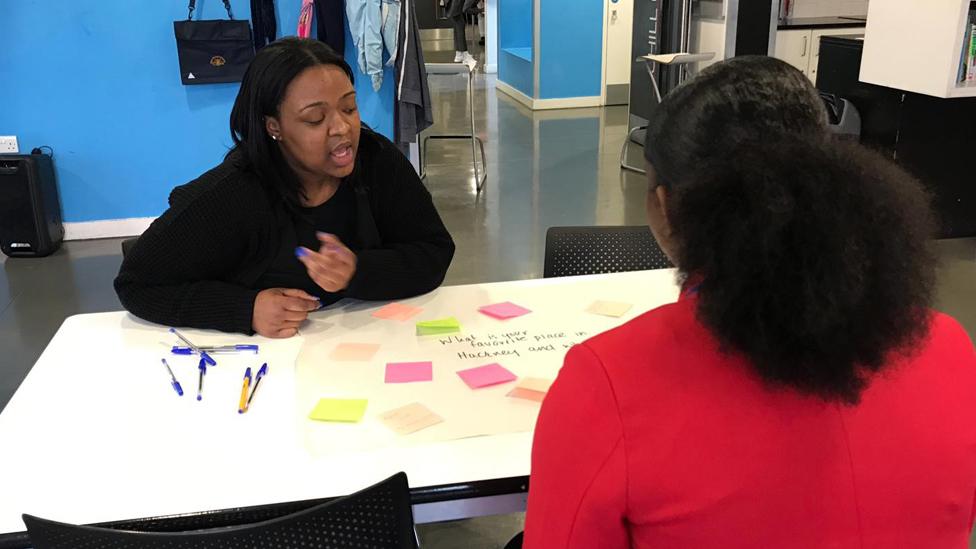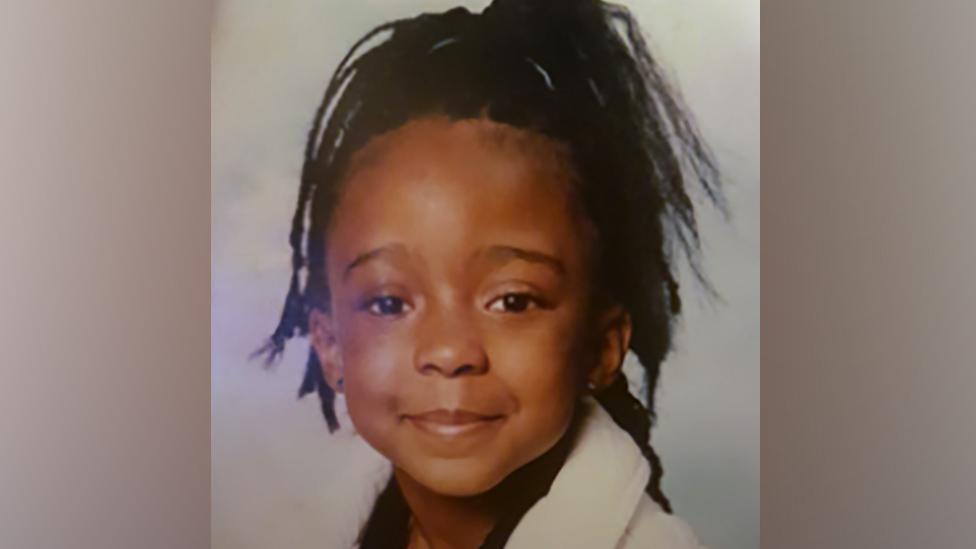School governor at 26 who shrugs off imposter syndrome
- Published

Shekeila Scarlett first met the board of governors at her secondary school when she was appealing her own exclusion. Facing a group of adults who would decide the 12-year-old's future was intimidating, especially because they looked nothing like her. She won the appeal but the experience never left her and now she chairs the board of governors at an east London school. At 26, she is one of the youngest people in the UK to do so.
The reason Shekeila was excluded from her secondary school is something she shares openly with teachers, parents and students at Stoke Newington School in Hackney, where she has just completed her first term as the chair of governors.
"It's not a secret, it's my story and I'm not ashamed of it," she says.
A boy at school who had been bullying her for months told Shekeila to look after a Stanley knife he'd taken from the art department.
"Previous experience told me if I didn't do what he asked, he'd hurt me," she says.
He came to retrieve it from her after one lesson, and that was the end of her involvement. But later he got caught with the knife and Shekeila was told she'd be permanently excluded for handling it.
"My exclusion was a very dark time and I found things hard to navigate," she says.
"I was only a child, from a working-class background, and I didn't really understand the education system."
Her mum refused to send her daughter to a pupil referral unit, where Shekeila says she would have been the only girl. Instead, she found an advocate to help them appeal the decision.
Shekeila was out of school for two months while she waited for the appeal process to take its course. Part of it involved making her own statement to the board of governors.
As the 12-year-old prepared to read from her piece of paper, she nervously looked across the table at the governors.
"They didn't look like me or come from the background I came from," she says.
"Governing bodies should represent the community they serve. If you can't relate to the community, how can you understand and then do things in the best interests of the students?"
The decision to exclude Shekeila was overturned, but the experience had a lasting impact.
She enjoyed school, but she'd lost a lot of confidence after what felt like such a long time away.

Shekeila talking to a student as part of the Hackney Young Futures Commission run by the council.
"I felt like there was so much to catch up on - everyone was talking about new things and doing their hair differently, or had a new pair of trainers," she says.
"When you're 12, all that feels very important and I was thinking - what have I missed?"
To help her daughter re-engage with school, Shekeila's mum encouraged her to get involved in various development programmes, including one with a youth charity called Immediate Theatre.
This helped her regain her drive and confidence and forged the teenager's path to becoming involved in education as an adult.
"I set my mind to making sure there wouldn't be any more students like me, who have to sit in front of a governing body that doesn't reflect them," she says.
Last year, Shekeila became chair of trustees at Immediate Theatre. With the help of Hackney council, she also set up a programme to get young people involved in school boards as associates, and became a governor herself.
The role is voluntary and includes picking headteachers, making sure school money is well spent, and sitting on panels about exclusions and complaints. As chair - a position Shekeila took on in September last year - she also line-manages the headteacher.
One of her big goals is to reduce exclusions at the school and make sure students know who members of the board are.
"Governors are the legal keyholders for the school and for students not to know who they are is silly."
The board is in the process of recruiting some new members, who Shekeila says will be "from all walks of life". It's also important to include younger people.
"I'm a lot closer to the education system experience than almost all of the governors who sit on current governing bodies," says Shekeila.
The National Governance Association (NGA) admits there is a problem with representation and diversity on school governor boards.
"Governing boards are missing out on talent, passion and the range of perspectives which is needed for good governance," chief executive Emma Knights said.

As a child Shekeila would never have imagined what her future held.
This shows in the NGA's annual survey of school governors, external - in 2022, more than 90% of respondents were white. This is despite more than a third of students across UK primary and secondary schools coming from an ethnic minority background.
Just 1% of governors who responded were under 30 and 6% under 40.
However, 36% of respondents reported that their governing board successfully recruited a candidate from an underrepresented group.
A spokesperson for the Department for Education said:
"We recognise the importance and positive impact of a diverse board which is why we fund our Inspiring Governance programme in order to recruit and appoint suitable volunteers to serve as school governors."
In 2021-22 the programme set a target for a minimum of 14% of those recruited and appointed to governing boards to be from a Black, Asian or minority background - which they exceeded.
For all her achievements, Shekeila says imposter syndrome still creeps in from time to time when she's attending council meetings, boards or national events. When this happens she reminds herself of her mantra for 2023.
"You deserve to be here. You are being the change you want to see in the world, so sit at the table and own it.
"Twelve-year-old me wouldn't believe I'm now a chair - she would be proud."
- Published31 March 2022
